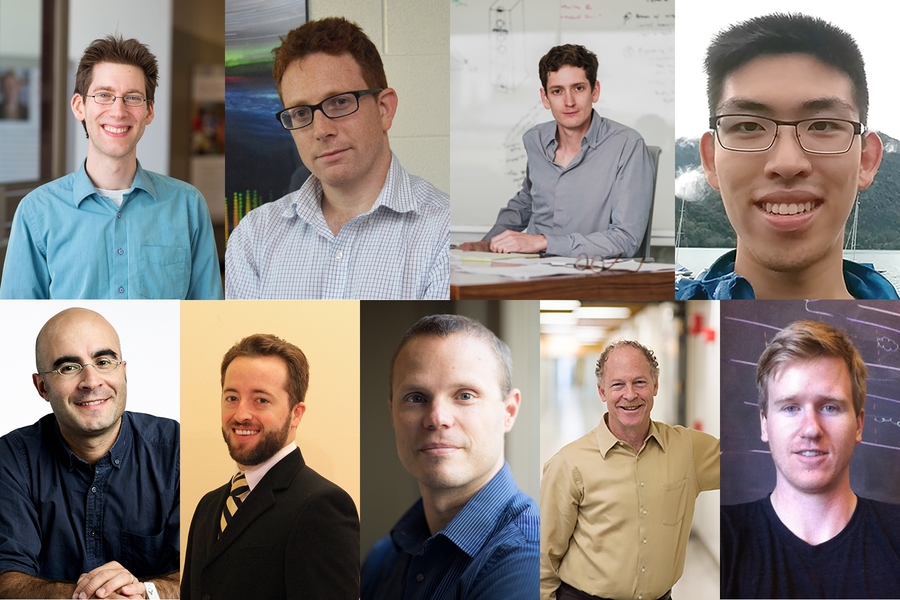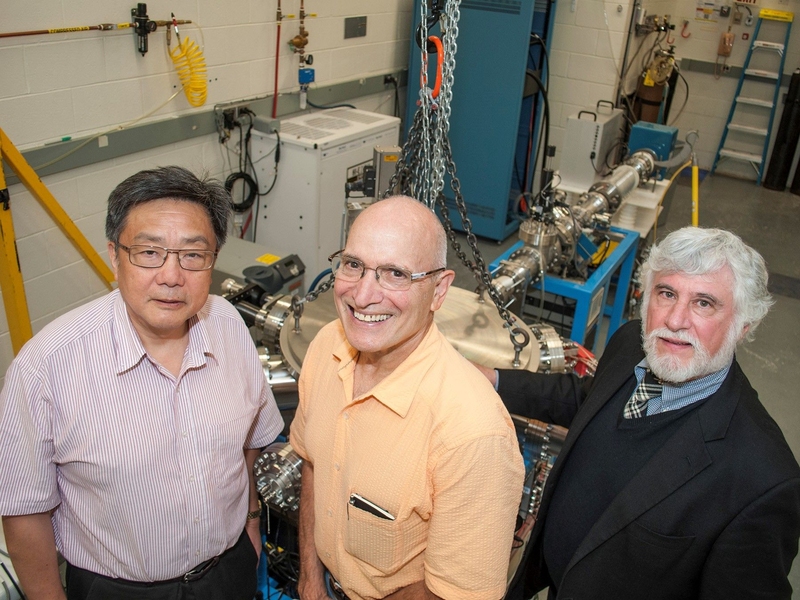Twelve members of the MIT community are among those recently honored with prizes and fellowships by the American Physical Society (APS). The awardees include faculty, students, and alumni from the departments of Physics, Chemistry, Civil and Environmental Engineering, Mechanical Engineering, Nuclear Science and Engineering, and Chemical Engineering.
As the leading membership organization for physicists from academia, industry, and the national laboratories, the APS recognizes work deemed by outstanding by leading researchers in the field worldwide.
Each year, no more than one half of 1 percent of the society membership is recognized by their peers for election as fellows. The 2017 MIT APS fellows include:
R. Scott Kemp, associate professor of nuclear science and engineering, has been named a fellow of the American Physical Society (APS). Nominated by the Forum on Physics and Society, Kemp was cited, “[f]or innovative applications of physics to arms control verification, and pivotal scientific contributions to nuclear nonproliferation diplomacy and the understanding of technology-policy interactions in international security.”
Pedro M. Reis, Gilbert W. Winslow Career Development Professor in the Department of Civil and Environmental Engineering and associate professor in the Department of Mechanical Engineering, was elected an APS fellow for his “contributions to the field of extreme mechanics, including elastic instabilities and geometrical nonlinearities.” He was also a 2017 recipient of an APS Early Career Award for this seminal research in soft matter.
Earlier in the year, three members of MIT's Plasma Science and Fusion Center (PSFC) High-Energy-Density Physics Division — including division head and Senior Research Scientist Richard Petrasso, Senior Research Scientist Chikang Li, and Research Scientist Fredrick Seguin — were honored with the APS John Dawson Award for Excellence in Plasma Physics Research.
Other recent APS award winners include:
Aram W. Harrow ’01, PhD ’05, an associate professor of physics and research in the Laboratory for Nuclear Science, received the 2018 Rolf Landauer and Charles H. Bennett Award in Quantum Computing for his “outstanding accomplishments in the mathematics of quantum information, and the development of new algorithmic primitives for quantum computers.” A faculty member of the MIT Center for Theoretical Physics since 2013, Harrow focuses on theoretical aspects of quantum computing and quantum information. In quantum information theory, he invented the concepts of “coherent classical communication” and “entanglement spread.” In 2009, Harrow received an Outstanding Referee Award from the APS.
Benjamin J.P. Jones PhD ’15, an assistant professor of physics at the University of Texas at Arlington, received the 2017 Mitsuyoshi Tanaka Dissertation Award in Experimental Particle Physics for his thesis in the field of experimental neutrino physics, “Sterile Neutrinos in Cold Climates.” Jones earned his PhD under the supervision of Professor Janet Conrad in the Department of Physics and the Laboratory for Nuclear Science, and received the Department of Physics’ 2015 Martin Deutsch Award for Excellence in Experimental Particle Physics.
Calvin Leung, a first-year PhD student in the Department of Physics, is a co-recipient of the 2017 LeRoy Apker Award, for his work as an undergraduate at Harvey Mudd College on the “development and experimental implementation of astronomical random number generators for loophole-free tests of Bell’s inequality and other applications in quantum fundamentals, astrophysics, and tests of general relativity.” Leung currently holds a National Defense Science and Engineering Graduate Fellowship and is also the recipient of the 2016 Astronaut Scholarship, the Louise and Graydon Bell Prize, the Mindlin Prize, and the Alfred B. Focke Award.
Ian Moult PhD ’16 received the 2017 J.J. and Noriko Sakurai Dissertation Award in Theoretical Particle Physics for his work “inventing powerful new observables for tagging boosted bosons, for developing new quantum field theory techniques for jet substructure calculations, and for devising new helicity operator methods to improve precision Higgs boson studies at the Large Hadron Collider.” Moult earned his PhD under the supervision of Professor Iain Stewart in the MIT Center for Theoretical Physics and received the Department of Physics’ 2015 Andrew M. Lockett Memorial Fund Award for his graduate research. He is currently a postdoctoral research associate at the University of California at Berkeley and the Lawrence Berkeley National Laboratory.
Keith A. Nelson, Haslam and Dewey Professor of Chemistry, was a co-recipient of the 2018 Frank Isakson Prize for Optical Effects in Solids for his “pioneering contributions to the development and application of ultra-fast optical spectroscopy to condensed matter systems, and providing insight into lattice dynamics, structural phase transitions, and the non-equilibrium control of solids.” Nelson is a fellow of the American Association for the Advancement of Science, the Optical Society of America, and the American Physical Society, a member of the American Academy of Arts and Sciences, and has received the Coblentz, Lippincott, Zewail, and Bomem-Michelson awards.
Bradley D. Olsen ’03, Paul M. Cook Career Development Professor of Chemical Engineering, was awarded the 2018 John H. Dillon Medal for his work “significantly expanding our understanding of the physics of polymers, including the self-assembly of block copolymers incorporating a fully folded protein, the influence of polymer shape on diffusion; for engineering novel gels; and for updating the theory of the modulus of a network.” Olsen’s previous honors include an Alfred P. Sloan Research Fellowship, the DuPont Young Professor Award and the Allan P. Colburn Award; he was named a Kavli Foundation Emerging Leader in Chemistry in 2017.
Jonathan Loren Ouellet, a postdoctoral researcher at MIT working in the Professor Lindley Winslow’s group in the Laboratory for Nuclear Science, received the 2017 Dissertation Award in Nuclear Physics for “his outstanding contributions to the search for neutrinoless double beta decay of 130Te, and setting a new limit on its decay half-life, at the Cryogenic Underground Observatory for Rare Events in Gran Sasso, Italy.” At MIT, he has recently begun working on a new cryogenic-based axion dark matter search, called ABRACADABRA.







